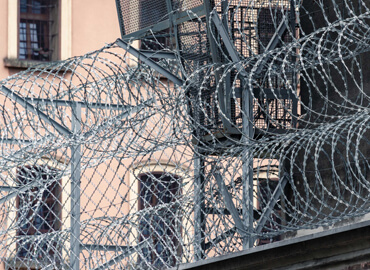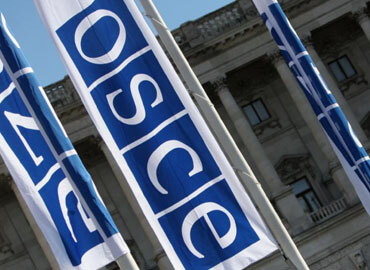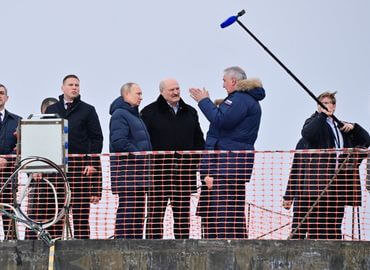For the European Union and the United States, as well as for all other countries that consider themselves promoters of democratic ideals, a critical moment is coming with regard to the dramatic events in Belarus, as Russia takes up a strategic position with international significance.
Putin’s Plan for Belarus
On September 14, as expected, Alexander Lukashenko met with Vladimir Putin.
Judging by the public statements made by Putin and the representatives of the Russian government, this meeting will finalize the so-called “settlement plan” offered by Lukashenka as a reaction to ongoing mass protests in Belarus. The plan is expected to include carrying out constitutional reform, after which Lukashenka promises to hold new presidential and parliamentary elections. The plan will also include the removal of restrictions on the development of political parties, weakening the power of the president in favor of the executive branch and the parliament, and thus, will be presented as “liberalization.” Belarusian society is indeed ready for both liberalization and the transition to parliamentary democracy, and to constitutional reform; however, in the reverse order. First, Lukashenka has to leave, then free and fair presidential and parliamentary elections will take place, and only after that, constitutional reform can be carried out. Under the current Belarusian leadership, offers of constitutional reform cannot be trusted.
This plan is a gross deception: to the West, the reform package proposed by Lukashenka may seem as “liberalization”, while in reality it simply aligns the Belarusian political system with the Russian model. This plan is not a step towards truly inclusive politics but is instead a transition to a more sophisticated model of electoral authoritarianism, with fictitious powers of parliament and a system of allegedly “opposition” parties that in reality are all loyal to the authoritarian government.
The Kremlin and Putin use this model within Russia to present an international face of fairness and human rights while internally maintaining absolute authoritarianism. In short, the plan is only “modernizing” the dictatorship in Belarus, not replacing it with a truly free alternative. The Kremlin fully supports this plan. Lukashenka has already presented it to the OSCE, and Putin will promote it while negotiating with Paris and Berlin. If the European countries agree with this plan and it receives the OSCE support, the Belarusian society will interpret it as a harsh betrayal.
The EU and EU member states stance on the situation
The European Union has already created a strong starting position to further support the Belarusian society.
On August 19, an emergency summit of the heads of European foreign ministers did not recognize the results of the presidential election in Belarus. The summit agreed to bring in new personal sanctions against Belarusian officials responsible for violence, repression and election fraud. The sanctions are expected to be passed on September 21. Economic sanctions are not expected yet. In addition, on August 31, the three Baltic states acted independently to impose sanctions against 30 high-ranking Belarusian officials, including Lukashenka. On September 9, PACE urged the Council of Europe to urgently set up an international investigative body to collect information and secure evidence on human rights crimes that took place in Belarus following August 9 elections. On September 10, the Parliament of Lithuania (Seimas) recognized Sviatlana Tsikhanouskaya as the only elected leader of Belarus.
What is happening on the ground
As of September 10, Lukashenka and his special services continue to liquidate the Coordination Council under laws restricting “attempting to seize power”. Of the members of the presidium inside the country, only the Nobel Prize laureate in literature, Sviatlana Aleksievich, remains free. Deportations of Belarusian citizens are carried out without any legal basis. The case with Volha Kavalkova (the representative of the Tsikhanouskaya campaign), Anton Radniankou and Ivan Krautsou (the representatives of the Viktar Babaryka’s campaign) are only a few examples. Two other Coordination Committee members and representatives of the Babaryka campaign — Maryia Kalesnikava and Maksim Znak — are in jail and are also charged with “an attempt to seize power.”
The Kremlin is providing direct support to Lukashenka and carrying out large-scale interference in the internal affairs of Belarus.
This support is reflected in three areas:
- Financial support. On September 10, it became known that Russian Prime Minister Mishustin ordered the state banks of Russia (Sberbank, VEB, VTB) to provide liquidity support to Belarusian banks if Minsk does not have enough reserves to support the Belarusian ruble. Putin agreed to restructure the debt of Belarus, allowing Lukashenka to not pay off $1 billion of debt this year.
- Media support. A large team of journalists led by the RT media network deputy editor-in- chief has been placed into Minsk to ensure synchronized coverage and interpretation of the protests in the state media of Belarus and Russia.
- Diplomatic support for Lukashenka’s plan for constitutional reform. Since Lukashenka is apparently avoiding direct communication with European leaders, Putin will evidently be the one presenting the «settlement» plan to Macron and Merkel. It is suspected this arrangement was an intentional arrangement between Lukashenka and Putin. Today, we can say that this is the «plan of Lukashenka-Putin» as that is how it has been presented to the international community.
In addition, there are reports of the work of several groups on the ground associated with the Russian special services; however, these forces are more likely here in Belarus to keep the situation under the Kremlin’s control, rather than to help Lukashenka directly. It should be emphasized that, unlike with the events in Ukraine in 2014, in Belarus, Putin is acting more carefully to avoid accusations of “interference”. Support is provided through institutions: the government, the state corporations, the state media. In support of constitutional reform and strengthening the role of parliament, all notable pro-Russian figures in Belarus have already made policy statements. During the next stage, when organizing and carrying out constitutional reform, these parties will be assigned a role of building a parliament that will be convenient for the Kremlin. The work of the Kremlin proxies in Belarus was analyzed in detail by Strategic Action Network for Security (iSANS) in two large reports in 2019.
Belarus Crisis in the International Context
Brutality on the ground
The government actions on August 9-13 were shocking. The scale of demonstrated violence by the government special forces on the streets, and during detentions in isolation wards seems to have no analogues in the political history of Europe in the post-WWII period, even when compared with the repressive measures of the right-wing dictatorships in Portugal and Greece in the first half of the 1970s or with the actions of the governments of the Eastern bloc in the second half of the 1980s. Lukashenka’s actions bring to mind the suppression of the “Prague Spring” in 1968 or the dispersal of a rally in Tbilisi in 1989.
In modern Europe, such events cannot remain without investigation by an international commission.
The attempt at the life of Alexey Navalny
Putin’s support for Lukashenka comes against the backdrop of a monstrous act of political banditry
— an attempt on the life of Alexei Navalny using a chemical warfare agent. This event, on par with the prior Kremlin-backed murders of Magnitsky and Nemtsov, is added to the series of poisonings
of other opponents or critics of the Russian political regime. It should be emphasized that, in none of these cases, did the Kremlin conduct an exhaustive investigation, and completely ignored the demands of the internal Russian and international community. There is a direct long-term parallel between Lukashenka’s and Putin’s actions towards the opposition, de facto, they use the same set of methods of authoritarian suppression of a social movement: intimidation, bribery, political terror (attacks, murders, disappearances of people), pushing opponents into emigration or deportations.
Business as usual approach means betrayal
Fundamental factor: there is a growing mass perception of the ineffectiveness of sanctions, or their devaluation. “Betrayal by the West” turns into a topic of historical significance. The societies of the post-Soviet transition countries perceive the position of the democratic governments of the leading Western countries as a compromise with authoritarian regime driven by their political egoism. The events in Belarus and the poisoning of Navalny undoubtedly are pivotal points in the perception of this opportunism. The possible real reaction by the democratic countries is limited by the institutional and legal possibilities at their disposal. We cannot expect actions that go beyond what will be approved by the voters of these countries. However, it is clear that the response to the current situation cannot remain within the limits of “expanding sanctions.”
Extraordinary situation calls for extraordinary measures
Belarus crisis is an extraordinary situation occurring in the middle of Europe, on the borders of the EU and NATO. The unprecedented scale of the election fraud, extraordinary police brutality against Belarusian citizens, peacefully exercising their rights for freedom of assembly, massive use of torture in places of detentions, several murders and enforced disappearances – this is a non-exhaustive list of the events that followed presidential election in Belarus.
In his attempt to hold on to power Lukashenka is also surrendering Belarus independence and future of its people to Putin’s Russia by publicly inviting Russian special security forces to suppress Belarusian citizen protests. Lukashenka also covertly invited Russian propaganda forces, led by the RT people, to step in instead of Belarusian journalists on strike and to modify Belarusian state media in accordance with Russian propaganda.
De-facto we are witnessing a hybrid aggression of Kremlin against the Belarus nation, suppressing democratic aspirations of Belarusians and aiming at the “soft annexation” of Belarus.
This means that, in the current situation, the response of the European Union and the United States, as well as international organizations, and alliances of national governments should be a response that leaves the impression of a massive package that goes beyond previous actions. In our opinion, it is important that all the measures are carried out (or introduced) simultaneously as a package.
What the international community (EU and US) should do:
- Non-recognition of Lukashenka as President and a special status for Sviatlana Tsikhanouskaya. Provide Sviatlana Tsikhanouskaya with the special status of a legitimate representative of Belarus nation that would allow her to be part of all negotiations regarding Belaru’s future. No such negotiations should take place without legitimate representatives of Belarus. Lukashenka either after inauguration or after the 9 of November should be unanimously designated as a power usurper and not as a legitimate president of Belarus. Accordingly, should be treated current government, re-appointed, and appointed by Lukashenka after the elections. After Lukashenka’s term of office expires at 00:00 on November 10, the now informal status of Sviatlana Tsikhanouskaya will gain more credibility, considering the fact that the EU countries have already declared the elections in Belarus not being free and fair. However, the “government in exile” is a weak structure for continuing the consolidation of Belarusians in their struggle against the usurpation of power by Lukashenka. The European Union should offer Tsikhanouskaya such a status in Brussels that would allow her and a wide range of active participants in the Belarusian struggle for democracy to act on the public arena, relying on all the opportunities that Europe and the United States provide.
- Immediate package of restrictive measures. Introduce an immediate package of targeted restrictive measures on Lukashenka and his immediate circle, including individuals and companies providing financial and economic support to the regime.
- Tribunal (an international investigative body). To establish an international investigative body (a tribunal) to investigate the events in Belarus during and after the 9 of August, to identify the perpetrators involved in the electoral fraud, those who gave and implemented orders on police attacks and torture against Belarus citizens, abductions, disappearances, and killings. The investigation should result in the “Belarus Magnitsky Act” and list, international prosecution of designated persons, including targeted restrictive measures and use of the universal jurisdiction. (The UN, OSCE, and the Council of Europe mechanisms and capacities could be used).
- List of adjoining actors. The imposition of personal sanctions against a wide range of those persons from the Russian side that are participating in the implementation of Putin’s plan with regard to Belarus. The list should include both official operators and representatives of the Kremlin “proxies” actively working towards joining Belarus to Russia. Kremlin activities in Belarus should be defined as hybrid warfare, an attack against the sovereignty against Belarusian people, and an attempt to install Kremlin-backed usurper in
power in Belarus. Therefore, targeted restrictive measures should be introduced on all persons and entities implementing Kremlin-backed activities in Belarus. - Act on Hybrid War. The Kremlin’s actions in relation to Minsk should be recognized as “hybrid war.” It should be emphasized that the “Lukashenka-Putin settlement plan” entails an intense hybrid war of the Kremlin against Poland, the Baltic countries, the Czech Republic, Slovakia, and subsequently against all those countries that have taken a firm position of support of the Belarusian society. At the level of the European Union, following the events of 2020, adopt the “Hybrid War Act”, which exhaustively characterizes the Kremlin’s actions in Europe as a strategy of continuous interventions, destabilizations, and unacceptable actions on the territory of the EU countries. In the future, such an act will allow the national governments of the EU countries to build up concrete tools for responding to the Kremlin’s toxic actions in Europe.
- Act on RT (Russia Today) media network. RT, as one of the main tools of hybrid aggression against Belarus, should be banned from all the EU member states. Russian state-owned RT media network has been appointed by the Kremlin as the main information and political hub to create content aimed at discrediting the protest movement in Belarus, its goals, and the intentions of its leaders. It is impossible to ignore this frank, cynical use of the Kremlin’s media capabilities against both the Belarusians and the real intentions of the governments of the EU countries. This direct use of the Kremlin’s propaganda tool in the Belarusian crisis is the best evidence of the need for a separate package of measures for RT. The result of these measures should be a clear declaration of the consolidated intention to paralyze any work of this media network outside the Russian Federation.
- Act of support of Belarusian society («Marshall Plan» for Belarus). Form a special international body to assist Belarus nation and its democracy transit, which should elaborate and adopt a “Marshall plan” for Belarus, which provide assistance to Belarusian society in crisis and assist in democracy and economy transit of post-Lukashenka Belarus. Currently, out of all countries in the European Union, the governments of Poland, Lithuania, Latvia, Czech Republic, Slovakia have assumed a particularly significant role in supporting the Belarusian society. This leads to the escalation of the conflict between them and Moscow. This situation cannot persist for a long time. For further support of the Belarusian society, the creation of a Commission at the level of the governing bodies of the European Union is required. Such a commission will legitimize and strengthen the measures of support that the neighboring countries provide to Belarusians. This act must clearly show the motivation for all EU countries to act towards democratizing Belarus and preserving its sovereignty.
- Saving Belarus IT-sector. A particularly important area of concern is the destruction of the IT cluster in Belarus and repressions against representatives of the Belarusian creative industries. As an example, the Minsk office of a famous start-up headquartered in San Francisco and founded by a Belarusian native Mikita Mikado was attacked by Lukashenka’s special services. These actions by the Belarusian government caused understandable indignation of the global environment of IT specialists, startups, and programmers. The progressive sector must be supported in an institutional form at the level of the governing structures of the European Union.
Материал доступен на русском языке: Беларусь – рождение нации или поглощение империей Путина











